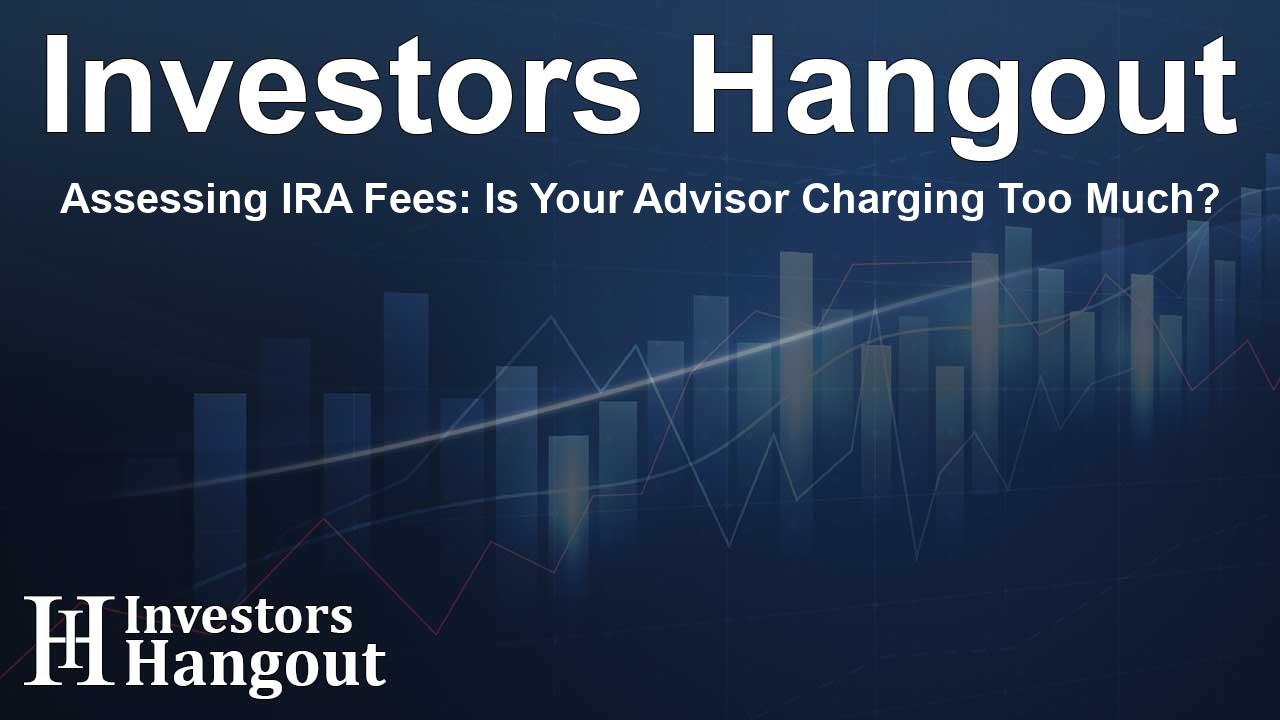Assessing IRA Fees: Is Your Advisor Charging Too Much?

Understanding IRA Fees and Their Importance
When planning for a secure financial future, grasping the concept of IRA fees is vital, especially for those entering their retirement years. It's important to evaluate whether the fees tied to your individual retirement account (IRA) are justified by the services you receive. To illustrate this, let's consider the situation of Garry, a 66-year-old who is concerned about whether he is being charged fairly.
Reviewing Your Monthly Contributions and Associated Fees
Garry contributes $272 each month to his IRA, but he also faces $136 in fees—meaning that half of his contribution goes toward these charges. This significant percentage raises concerns about the actual value of the services provided by his advisor. It's crucial to understand how these fees are determined to see if the services offered are worth the cost.
How Are Fees Determined?
Gaining insight into how financial advisors calculate their fees is an essential step in making informed investment choices. Most advisors base their fees on the total assets they manage, typically expressed as an annual percentage that can vary with the account balance.
Exploring Various Fee Structures
Advisors can employ different methods to charge clients, including:
Commissions: Some advisors earn commissions from the investment products they sell. Although these are often minimal (usually under 10%), this fee structure may create potential conflicts of interest.
Asset-based Fees: This is a common approach where fees are calculated based on the size of your investment portfolio.
Flat Fees and Hourly Rates: In certain situations, advisors may charge a flat fee for their services or bill clients on an hourly basis.
Evaluating the Value of Your Advisor
Understanding how fees are calculated is only part of the equation; it’s equally important to assess the value you receive for those fees. A common benchmark for larger accounts is around 1%. While Garry’s fee of approximately 1.35% might seem higher than average, it could be justified if he is receiving comprehensive financial planning services.
Assessing Communication and Services Provided
It’s vital to evaluate both the frequency and quality of communication you have with your advisor. If Garry seldom hears from his advisor, it may indicate that he could benefit from switching to a service that offers similar management at a comparable cost. A straightforward conversation with his advisor can help clarify what services he is actually receiving in exchange for his fees.
Next Steps for Improved Financial Management
After considering these factors, what should Garry do next? First, it’s wise to review the documentation he received when he started the service agreement. Understanding these details can shed light on the fee structure and the services included. If Garry feels that the services provided by his advisor do not match the fees he is paying, exploring other options is crucial.
Additionally, seeking better alternatives or discussing his concerns with his current advisor could lead to greater satisfaction. With financial tools and resources becoming more accessible, utilizing these tools for comparison and better planning is also beneficial. Ultimately, being aware of your worth, understanding the costs, and engaging in the right conversations can significantly improve your financial well-being.
Frequently Asked Questions
How can I evaluate whether my IRA fees are reasonable?
Begin by comparing your fees to industry standards and assessing the value of the services your advisor provides.
What should I do if I believe my fees are too high?
Consider having a direct conversation with your advisor about your concerns or seek additional opinions from other financial professionals.
Are there different types of advisors available for IRA management?
Yes, advisors may work on commission, charge fees based on assets managed, or provide flat-rate services. It's important to determine which option suits you best.
What constitutes good value in financial advisory services?
Good value generally includes regular communication, a comprehensive range of services, and transparency regarding fees.
Can I adjust my investment strategy without changing advisors?
Yes, it’s advisable to discuss potential adjustments to your investment strategy with your current advisor to ensure it aligns with your financial goals.
About The Author
Contact Evelyn Baker privately here. Or send an email with ATTN: Evelyn Baker as the subject to contact@investorshangout.com.
About Investors Hangout
Investors Hangout is a leading online stock forum for financial discussion and learning, offering a wide range of free tools and resources. It draws in traders of all levels, who exchange market knowledge, investigate trading tactics, and keep an eye on industry developments in real time. Featuring financial articles, stock message boards, quotes, charts, company profiles, and live news updates. Through cooperative learning and a wealth of informational resources, it helps users from novices creating their first portfolios to experts honing their techniques. Join Investors Hangout today: https://investorshangout.com/
The content of this article is based on factual, publicly available information and does not represent legal, financial, or investment advice. Investors Hangout does not offer financial advice, and the author is not a licensed financial advisor. Consult a qualified advisor before making any financial or investment decisions based on this article. This article should not be considered advice to purchase, sell, or hold any securities or other investments. If any of the material provided here is inaccurate, please contact us for corrections.
